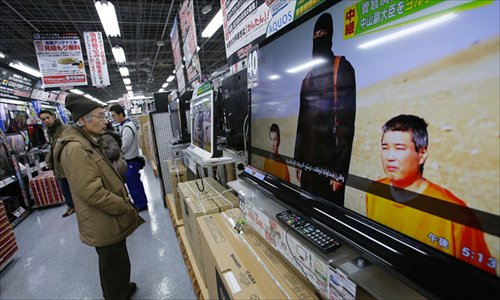IS threatens to kill 2 Japanese held hostage
Abe vows not to give in, says saving lives top priority

A man watches a television broadcasting a report about two detained Japanese at an electronics store in Tokyo on Tuesday. The release of an online video Tuesday purporting to show an Islamic State figure demanding $200 million in ransom for two Japanese hostages ambushed Japanese Prime Minister Shinzo Abe as he was wrapping up a six-day tour of the Middle East. Photo: AP
The militant group Islamic State (IS) released an online video on Tuesday purporting to show two Japanese captives, threatening to kill them unless it receives $200 million in ransom, Reuters reported.
A black-clad figure with a knife, standing in a desert area along with two kneeling men wearing orange clothing, said the Japanese public had 72 hours to pressure their government to stop its "foolish" support for the US-led coalition waging a military campaign against the IS, which now controls large parts of Iraq and Syria.
The militant, who spoke in English, demanded "200 million" without specifying a currency, but an Arabic subtitle identified it as US dollars. The video identified the men as Haruna Yukawa and Kenji Goto.
Although the video was not dated, it was released days after Japanese Prime Minister Shinzo Abe pledged around $200 million in non-military assistance for countries battling against the IS during a visit to Cairo on Saturday.
Abe, who is on a trip to the Middle East, told a press conference in Jerusalem that the threat was "unacceptable."
"I strongly demand that they not be harmed and that they be immediately released," he said. "The international community will not give in to terrorism and we have to make sure that we work together."
He also said that Japan attaches the utmost priority to saving lives, and gathering information with help from other countries.
In Tokyo, Japan's foreign ministry said it was checking the video to see whether the footage was genuine.
Goto is a freelance reporter who was based in Tokyo. He has written books on AIDS and children in war zones from Afghanistan to Africa and reported for news broadcasters in Japan.
Yukawa, 43, allegedly traveled to Iraq and Syria last year after telling friends and family that he thought it represented a last chance to turn his life around.
Over the previous decade, he had lost a business to bankruptcy, lost his wife to cancer and become homeless, according to his father and an online journal.
Abe is set to discuss the crisis with Palestinian President Mahmoud Abbas and shorten his scheduled trip.
Since August, the IS has murdered three Americans and two Britons, posting grisly video footage of their executions.
The militant who appeared in the video threatening the Japanese hostages spoke with a very similar southern English accent to the militant who appeared in the footage posted of the executions of the Britons and Americans, AFP reported.
"The Japanese public has always prioritized the safety of captives, which will pressurize Abe in terms of domestic political concerns. It suggests that he might pay a ransom," Hu Lingyuan, a professor with the Center for Japanese Studies at Fudan University in Shanghai, told the Global Times Tuesday.
However, Hu also noted that doing so would go against Abe's diplomatic policy which is normally in line with the US.
Official policy in the US and UK regarding such kidnappings is to refuse to cave in to terrorist demands by paying ransoms.
This is not the first time that Japanese nationals were held hostage in the Middle East. A Japanese student was released in 2008 after being held by a smuggling ring for eight months in Iran. The kidnappers were arrested.
Abe said on Tuesday that Japan would still go ahead with the $200 million in aid.
"The international community needs to respond firmly and cooperate without caving into terrorism," Abe said.
Japan has a lot invested in Middle Eastern economies and this is very unlikely to change in the wake of the incident because of its energy requirements, Lü Yaodong, director of the Institute of Japanese Studies at the Chinese Academy of Social Sciences, told the Global Times Tuesday.
"Abe has pledged to boost Japan's role in global issues, such as anti-terrorism, so he must hold a firm attitude against terror in this incident by still providing the aid," Lü noted.
Agencies contributed to this story